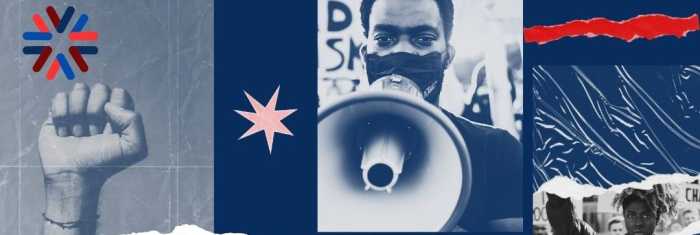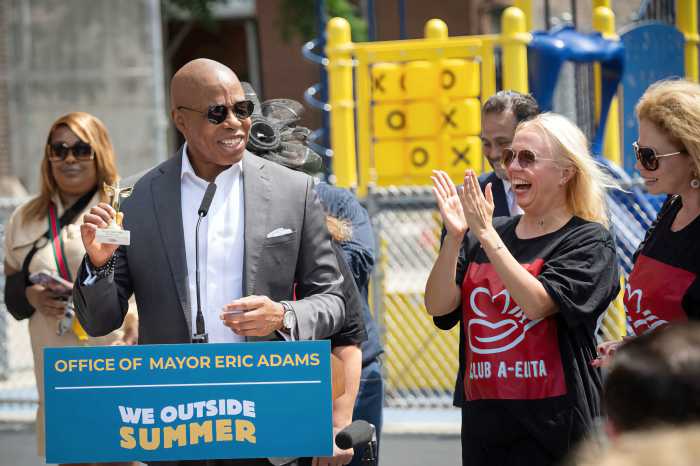“The Persian Version,” made by bi director Maryam Keshavarz, could have been an excitingly unconventional piece of personal filmmaking. Instead, it leaps from style to style, place to place, and time to time with little direction. Its opening scene breaks stereotypes about Muslim women. (Keshavarz’s 2011 feature “Circumstance” was a love story between two girls in Iran.) To the tune of Wet Leg’s “Chaise Longue,” a woman in a burqa strides through Manhattan. She winds up at a Halloween party, where she wins top prize for using it as a costume. The women in her family have never worn such clothes, and they defy images of Iranian women as passive victims. But the connections Keshavarz makes between her two main characters, Leila (Layla Mohammed) and her mother Shireen (played by Niousha Noor as an adult and Kamand Shafiesabet as a teenager), get lost. The film only finds its stride in a section depicting Shireen’s troubled youth, when she married an adult man at 13.
Leila has had enough success as a filmmaker that her work plays the New York Film Festival, but she still feels a degree of alienation from her mother. Although she identifies as a lesbian, she has a one-night stand with Max (Tom Byrne), an actor she met at the party. (Since he’s dressed in drag for a performance of “Hedwig and the Angry Inch,” she mistakes him for a drag queen.) Her failed marriage to a woman is roughly sketched out. The resulting pregnancy forces Max to become a permanent part of her life. She comes from a family with eight brothers, where she and her mother and grandmother are the only women. Yet after her father Ali (Bijan Daneshmand) suffered a hospital stay that left them in debt, Shireen quickly learned how to erase it by getting a momentary settlement for an accident that broke her neck. The need for money motivated her to get her GED, soon followed by her real estate agent’s license.
One of the biggest problems with “The Persian Version” is its uncertain sense of time. Low budgets make period pieces difficult. As a result, it avoids extensive hair and makeup changes to the actors. Still, its story begins in the 1960s, when Shireen was a teenager, and ends in the 2000s. Even so, the use of “Chaise Longue,” released last year, implies that the film takes place in the present. Instead of making extensive hair and makeup changes to the actors, Keshavarz cast different performers as young and old versions of Shireen and Ali. The result is that the cast looks basically the same even as decades pass. A scene set at the Tehran airport unconvincingly tries to turn an American location into an Iranian one with a few flags and signs in Farsi.
The first half hour of “The Persian Version” suggests a more playful film than the one it turns into. Keshavarz includes animation and has Leila speak directly to the audience (even in the middle of a sex scene). The scenes depicting Shireen’s past are told in a much more sedate style, with a distant touch of neo-realism as she rides on a bus through Iran. Keshavarz has spoken about her desire to tell a joyful Iranian-American immigrant story. In the key scene, Leila plays the cassette of Cyndi Lauper’s “Girls Just Want to Have Fun.” She snuck back to Iran to her family, who dances in a courtyard. The closing credits return to this, with the song performed in a Middle Eastern-inflected style by Niousha Noor. Gay producer Rostam Batmanglij, a former Vampire Weekend member, composed the score.
“The Persian Version” resists settling on a single protagonist. The experiences of Leila and Shireen are too tightly wound together, although Leila does not fully realize this until she becomes pregnant. This Iranian-American story lets its characters into the American dream, rather than dwelling on their most difficult moments. Too bad Keshavarz’s style never quite lands at the colorful exuberance for which it aims. A poptimist spirit animates the film without really being reflected in the direction and cinematography, but its sense of humor so often lean towards sitcom cuteness. (Is anyone shocked by a grandmother singing the praises of anal sex?) It’s a shame that its awkward editing and unclear timelines detract from the joy it wants to convey.
“The Persian Version” | Directed by Maryam Keshavarz | In English and Farsi with English subtitles | Sony Pictures Classics | Opens Oct. 20th


































